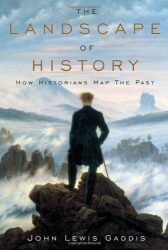KTM Blog
Catherine’s Reading Recommendations
April 7, 2020

Historiography
by Catherine Prescott, Lead Curator and Assistant Museum Director
As a kid, I was always curious about how things work and how they're made. Even now, I take things apart to see how they work—usually to try to fix them. I also loved the process of piecing them back together, like a puzzle. Television shows like How It's Made and the children's book The Way Things Work fascinated me.
So, when I was introduced to the field of history known as historiography, I was immediately enthralled. Historiography is the study of historical writing and the methods historians use; it's sometimes called "the history of history". In historiography, you look at the historians, and how their context—time, place, culture—influenced their readings of the past. It is, essentially, The Way Things Work* or How It's Made: History Edition.
E.H. Carr's What Is History? was the first book I ever read in historiography. Originally delivered as a series of lectures at the University of Cambridge in the UK in 1961, What Is History? provides a broad introduction to the theory of practicing history. Throughout the book, Carr critiques the then-current idea in historical practice: the historian as objective authority. Carr's language may be slightly dated, and historical methodology has changed somewhat in the 60 years since it was written, but What Is History? was, and remains one of the key works in the field of historiography.
The Landscape of History by John Lewis Gaddis is an update to Carr and perhaps slightly more accessible to the layperson. It was also presented as a series of lectures, this time at the University of Oxford in 2002. In the book, Gaddis tackles historical thinking and how to "think like a historian." Some of the big questions he covers are "Is there such a thing as historical truth?" and "Is history a science?", and in the manner of all "good historians", his answers generally come down to "yes and no." Gaddis finds a good balance in how to practice history that is somewhere between the total objectivism of early 20th-century historians and the total subjectivism of post-modernist history (that way lies "alternative facts"). If you're interested in how historians see the world and practice their craft, The Landscape of History is an excellent introduction.
A popular book on historiography that I would also like to give mention to, is the one I think many have heard of: Lies My Teacher Told Me by James W. Loewen, which was re-released as a 3rd edition a few years back. Loewen analyzes the history taught in US high school history textbooks by looking at the stories and "truths" that are included or excluded. I don't necessarily agree with all the history he proposes should be in the textbooks or his reasonings for why they should be included, but Lies My Teacher Told Me does a great job at looking at how Americans have generally learned history in school, how that affects America's perception of itself, and how the myth of the immutability of history has been perpetuated. I have another of Loewen's books, Lies Across America, about the history told at historic sites, on my to-be-read shelf.
To see (or hear, rather) historiography in practice, I suggest two excellent podcasts: The History of Rome (THoR) by Mike Duncan and The British History Podcast (BHP) by Jamie Jeffers. Both are broad-based retellings of the history of their chosen region/empire. Both men discuss many of the sources they use and often explain why they value particular sources over others. There are many other similar podcasts covering many different parts of the world, but these are the two I'm familiar with.
I'll finish by recommending two fiction books featuring historians and historical practice. I've been asked, and have pondered, the "if you had a time machine, where would you go?" question many times. Doomsday by Connie Willis, and Just One Damned Thing After Another by Jodi Taylor are both about historians who have time machines, which they use to go back in time to observe and record history—with varying success.
I do want to note, considering current circumstances, that the central plot of Doomsday features the characters dealing with pandemics of new viruses both in the past and present day.
Happy reading!
*The Way Things Work author George Macaulay also wrote a fantastic satirical book on archaeological excavation and (mis-)interpretation called Motel of the Mysteries about a 41st-century archaeologist named Howard Carson (hehe) excavating a road-side motel from 1985.
